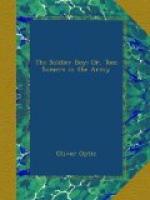But he had scarcely uttered the notes of glory and victory before his strength deserted him, and he would have dropped upon the ground if he had not been caught by Hapgood. He groaned heavily as he sank into the arms of his friend, and yielded to the faintness and exhaustion of the moment.
The surgeon said the wound was not a very bad one, but that the patient was completely worn out by the excessive fatigues of march and battle. In due time he was conveyed to the college building in Williamsburg, where hundreds of his companions in arms were suffering and dying of their wounds. He received every attention which the circumstances would permit. Hapgood, by sundry vigorous applications at headquarters, was, in consideration of his own and his protege’s good conduct on the battle field, permitted to remain with the patient over night.
The sergeant’s skull, as we have before intimated, was not very badly damaged, as physical injuries were measured after the bloody battle of that day. But his wound was not the only detriment he had experienced in the trying ordeal of that terrible day. His constitution had not yet been fully developed; his muscles were not hardened, and the fatigues of battle and march had a more serious effect upon him than the ounce of lead which had struck him on the forehead.
The surgeon understood his case perfectly, and after dressing his wound, he administered some simple restoratives, and ordered the patient to go to sleep. On the night of the 3d of May, he had been on guard duty; on that of the 4th, he had obtained but three hours’ sleep; and thus deprived of the rest which a growing boy needs, he had passed through the fearful scenes of the battle, in which his energies, mental and physical, had been tasked to their utmost. He was completely worn out, and in spite of the surroundings of the hospital, he went to sleep, obeying to the letter the orders of the surgeon.
After twelve hours of almost uninterrupted slumber, Tom’s condition was very materially improved, and when the doctor went his morning round, our sergeant buoyantly proposed to join his regiment forthwith.
“Not yet, my boy,” said the surgeon, kindly. “I shall not permit you to do duty for at least thirty days to come,” he added, as he felt the patient’s pulse.
“I feel pretty well, sir,” replied Tom.
“No, you don’t. Your regiment will remain here, I learn, for a few days, and you must keep quiet, or you will have a fever.”
“I don’t feel sick, and my head doesn’t pain me a bit.”
“That may be, but you are not fit for duty. You did too much yesterday. They say you behaved like a hero, on the field.”
“I tried to do my duty,” replied Tom, his pale cheek suffused with a blush.
“Boys like you can’t stand much of such work as that. We must fix you up for the next battle; and you shall go into Richmond with the rest of the boys.”




